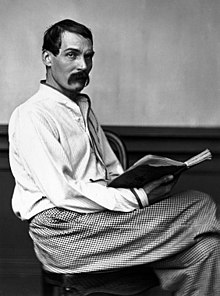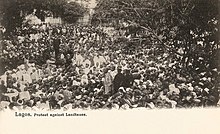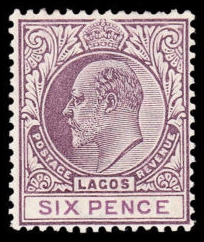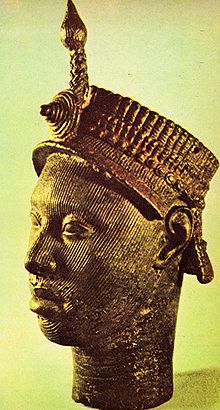Lagos Colony
Lagos was annexed on 6 August 1861 under the threat of force by Commander Beddingfield of HMS Prometheus who was accompanied by the Acting British Consul, William McCoskry.[8] Later exports included copra made from the coconut palm, guinea grains, gum copal, camwood and sesame (benne).[9] The earliest incarnation of Lagos was an Awori Yoruba fishing community located on the islands and peninsula that form the modern state.In the 16th century, Lagos island, which was known as Eko, was sacked and colonized by troops of the Oba of Benin during that kingdom's expansionary phase.[17][15] A Yoruba emigrant, the catechist James White, wrote in 1853 "By the taking of Lagos, England has performed an act which the grateful children of Africa shall long remember ... One of the principal roots of the slave trade is torn out of the soil".[26] Acting Governor William Rice Mulliner met the Bashorun of Abeokuta in May 1863, who told him that recent robberies of traders' property were due to the custom of suppressing trading so as to force the men to war.McCoskry communicated his view to the former explorer Richard Francis Burton, who visited Lagos and Abeokuta in 1861 while acting as consul at Fernando Po, and who was also opposed to missionary work.There was a small legislative council which was established when the colony was founded in 1861, with the priority mandate of assisting and advising the Governor but without formal authority, and was maintained until 1922.[35] On 17 February 1881, George was one of the community leaders who laid the foundation stone for the Wesley Church at Olowogbowo, in the west of Lagos Island.The Lagos government, at that time subordinate to Accra in the Gold Coast, was instructed to stay out of the conflict, despite the damage it was doing to trade, and attempts to mediate by the Saro merchants and by the Fulani emirs were rejected.[4] By 1884, George Goldie's United African Company had succeeded in absorbing all of his competition and eliminated the French posts from the lower Niger; the situation permitted Britain to claim the entire region at the Berlin Conference the next year.Governor Moloney nominated two Africans as unofficial representatives: the clergyman, later bishop James Johnson and the trader Charles Joseph George.The Lagos administration, acting through Samuel Johnson and Charles Phillips of the Church Mission Society, arranged a ceasefire and then a treaty that guaranteed the independence of the Ekiti towns.In 1892, he attacked Ijebu, and in 1893 made a tour of Yorubaland signing treaties, forcing the armies to disperse, and opening the way for construction of a railway from Lagos to Ibadan.A report that year described other products including gum and coconut oil, for which a small-scale crushing business had promise, various fibres, camwood, borewood and indigo, also seen as having large potential.[41] William MacGregor, governor from 1898 to 1903, instituted a campaign against the prevalent malaria, draining the swamps and destroying as far as possible the mosquitoes that were responsible for the spread of the disease.[46] In 1901, the first qualified African lawyer in the colony, Christopher Sapara Williams, was nominated to the Legislative Council, serving as a member until his death in 1915.George said "any obstacle in the way of publication of newspapers in this colony means throwing Lagos back to its position forty or fifty years ago".Egerton enthusiastically endorsed the extension of the Lagos – Ibadan railway onward to Oshogbo, and the project was approved in November 1904.






Lago ColonyEnglishBritish ColonyYorubalandSouthern Nigeria ProtectorateBritishNigeriaannexedHMS PrometheusWilliam McCoskryDosunmuLagos Treaty of CessionYorubaProtectorate of NigeriaLagos IslandLagos LagoonGulf of GuineaNiger River deltatropical savanna climatepalm oilexportscoconut palmguinea grainsgum copalcamwoodsesameOlofinOba of BeninBenin EmpireAshipafreebooterOba of Lagoscity-statehinterlandslave tradeReduction of Lagosbombarded Lagos into submissionKosokoAkitoyeGreat Britain-Lagos treatyLouis FraserBight of Beninvice-ConsulBenjamin CampbellCMS Grammar SchoolChurch Missionary SocietyFreetownSierra LeoneRichard Francis Burtonnaval forceBritish subjectsIbadanAbeokutaOgun RiverHenry Stanhope FreemanWilliam Rice Mullinerabolition of slaveryFernando PoBadagryVictorianMethodistCharles Joseph GeorgeOlowogbowoscramble for AfricaEgba Alakebreech-loadingFulaniGeorge GoldieUnited African CompanyBerlin ConferenceGold CoastCornelius Alfred MoloneyJames JohnsonSamuel JohnsonCharles PhillipsChurch Mission SocietyIlorinFrenchDahomeyGilbert Thomas CarterGeorge Chardin DentonRoyal Niger CompanyRoyal Botanic Gardens, KewWilliam MacGregorA major strikeChristopher Sapara WilliamsObadiah JohnsonWalter EgertonOshogboFrederick LugardProtectorate of Northern NigeriaColony and Protectorate of NigeriaFederal Capital Territory, AbujaJohn Hawley GloverGeorge DentonHenry Edward McCallumGovernment Gazette (Lagos)Timeline of LagossovereigntyOyekanHopkins, A. G.Past & PresentNigerian TribuneChisholm, HughEncyclopædia BritannicaLagos Metropolitan AreaAmuwo-OdofinEti-OsaAjeromi-IfelodunLagos MainlandSurulereAlimoshoIfako-IjaiyeKosofeMushinOshodi-IsoloShomoluAdeniran Ogunsanya College of EducationAugustine University IlaraCaleb UniversityCMS Grammar School, LagosCollege of Medicine, University of LagosFederal College of Education (Technical), AkokaFederal College of Fisheries and Marine TechnologyIgbobi CollegeIkenna Stars Academy
